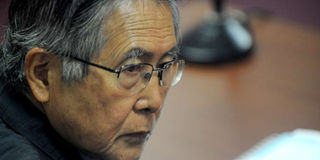Alberto Fujimori: Peru's pardoned ex-strongman

Peru's ex-President (1990-2000) Alberto Fujimori in court on September 30, 2009 facing corruption charges. He has asked Peru to forgive him. PHOTO | RAUL GARCIA | AFP
What you need to know:
- Alberto Fujimori's decade as president from 1990 was marked by a dramatic series of sieges, massacres and escapades.
- He was tried and sentenced to 25 years in prison for corruption and rights abuses.
- He received a humanitarian pardon from President Pedro Pablo Kuczynski.
LIMA
Peru's Alberto Fujimori, a one-time university dean, rose to the presidency, waged a bloody campaign against insurgents and was sentenced to 25 years in prison for corruption and rights abuses.
The ailing 79-year-old, loved by many for going after the rebels but hated by others for the ruthless, authoritarian way he governed, received a "humanitarian pardon" on Sunday.
‘FORGIVE ME’
He said the pardon ordered by current President Pedro Pablo Kuczynski was a "surprise." In a video filmed from his hospital bed, he spoke to Peru's citizens, asking them "to forgive me with all my heart."
Fujimori's decade as president from 1990 was marked by a dramatic series of sieges, massacres and escapades.
He ultimately ended up in jail as a frail, grey figure crippled by back pain and high blood pressure.
RIVALS
A descendant of Japanese immigrants, Fujimori was a marginal figure among political parties but cultivated the support of the armed forces.
Under him and his hardline security chief Vladimiro Montesinos, state forces virtually wiped out the leftist Shining Path and Tupac Amaru rebels.
Fujimori also clamped down hard on his political rivals. In 1992, he staged an internal coup, dissolving the legislature with the knowledge of only Montesinos and military chiefs.
"Act first, tell people about it later," he was quoted as saying.

Supporters of Peru's ex-president Alberto Fujimori in Lima on December 26, 2017 cheer outside the hospital where he was admitted. He has asked the people for forgiveness, two days after receiving a presidential pardon. PHOTO | ERNESTO BENAVIDES | AFP
FIGHTING TERROR
One of the most dramatic episodes of his time in power was a four-month hostage ordeal at the Japanese embassy in Lima from December 1996.
Commandos ended up raiding the embassy, saving nearly all the VIPs held by Tupac Amaru guerrillas and killing the 14 hostage-takers.
That strengthened Fujimori's reputation for fighting terrorism with a firm hand.
At the same time, he won popular support for boosting the economy of the South American country, a major mineral exporter.
RIGHTS VIOLATIONS
His neo-liberal economic policies won him the support of the ruling class and international financial institutions.
But the dark side of his supposed success was revealed when he was found guilty of human rights violations for the murders of suspects by death squads.
Fujimori's downfall began in 2000 after Montesinos was exposed for corruption.
The president fled to Japan and sent a fax announcing his resignation.
CORRUPTION
Congress voted to sack him instead and ban him from public office for 10 years.
He was eventually arrested when he set foot in Chile and extradited back to Peru for trial.
A court held him responsible for the killings of 25 supposed guerrillas and sympathisers in 1991 and 1992.
It sentenced him in 2009 to 25 years in jail.
In a separate case, he pleaded guilty to bribing lawmakers and spying on former rivals while in power.

People hold a protest against Peruvian President Pedro Pablo Kuczynski's humanitarian pardon to jailed ex-president Alberto Fujimori, in Lima on December 25, 2017. PHOTO | JUAN VITA | AFP
FAMILY
The soap opera within the Fujimori family matched the drama of his turbulent decade in office.
His former wife Susana Higuchi divorced him in 1994, and later accused his men of torturing her.
His daughter Keiko Fujimori took over as the nation's first lady at the age of 19.
Shortly after their divorce, Higuchi ran against her ex-husband in an election in 1995, but he blocked her by passing a law prohibiting presidents' close family from succeeding them directly in office.
PARDON
Once jailed, Fujimori was in and out of the hospital with heart, back and stomach trouble. He had several operations to remove cancerous growths from his tongue.
The courts in 2017 rejected efforts by Fujimori's family to have him pardoned and freed from prison.
But just days after Fujimori's son Kenji helped Kuczynski survive an impeachment vote, the presidency announced that the jailed strongman would be granted clemency due to his poor health.





